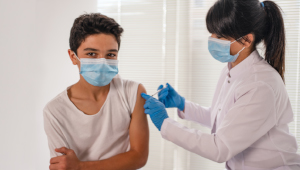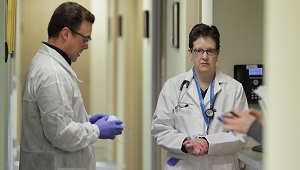Lisa A. Jackson, MD, MPH
Biography
Lisa A. Jackson, MD, MPH, is an internist and infectious disease epidemiologist who has conducted clinical and epidemiologic studies of vaccine safety and efficacy since 1991.
Dr. Jackson is the principal investigator (PI) of KPWHRI’s Vaccine and Treatment Evaluation Unit — one of 10 network sites that the National Institutes of Health (NIH) sponsors. In this role, she leads the phase 1 clinical trial of the COVID-19 vaccine co-developed by Moderna and NIH. Launched in March 2020, this trial was the first in the world to begin testing a COVID-19 vaccine. She is also leading the phase 3 clinical trials of the COVID-19 vaccines developed by Moderna and NIH and by Janssen Pharmaceutical Companies, part of Johnson & Johnson, at KPWHRI.
Additionally, Dr. Jackson serves as KPWHRI’s principal investigator in the Vaccine Safety Datalink Project (VSDP). Sponsored by the Centers for Disease Control and Prevention (CDC), VSDP conducts ongoing research on the safety of licensed vaccines in routine use.
Dr. Jackson has written more than 200 peer-reviewed publications and 14 book chapters. She is a past member of the Food and Drug Administration’s Vaccines and Related Biological Products Advisory Committee and the National Vaccine Program Office’s National Vaccine Advisory Committee.
After receiving her medical degree from the University of Virginia School of Medicine, in Charlottesville, Dr. Jackson earned her Master of Public Health (MPH) degree at the University of Washington (UW) School of Public Health. She completed her internal medicine residency training at the UW School of Medicine and served as an epidemic intelligence officer and preventive medicine resident at the CDC.
Research interests and experience
Vaccines & Infectious Diseases
Vaccine safety; COVID-19 vaccine safety and effectiveness; influenza vaccine effectiveness in the elderly; methodologic issues in vaccine effectiveness evaluations; pneumococcal polysaccharide vaccine effectiveness; pneumococcal conjugate vaccine immunogenicity in the elderly; epidemiology of E. coli bacteremia; epidemiology of community-acquired pneumonia
Recent publications
Jackson LA, Jackson ML, Weiss NS. Bias in studies of influenza vaccine effectiveness: the authors reply to Hak et al. Int J Epidemiol. 2006;35(3):799-800. Epub 2006 Apr 17. PubMed
Lindsay L, Jackson LA, Savitz DA, Weber DJ, Koch GG, Kong L, Guess HA. Community influenza activity and risk of acute influenza-like illness episodes among healthy unvaccinated pregnant and postpartum women. Am J Epidemiol. 2006;163(9):838-48. Epub 2006 Mar 22. PubMed
Jackson LA, Dunstan M, Starkovich P, Dunn J, Yu O, Nelson JC, Rees T, Zavitkovsky A. Prophylaxis with acetaminophen or ibuprofen for prevention of local reactions to the fifth diphtheria-tetanus toxoids-acellular pertussis vaccination: a randomized, controlled trial. Pediatrics. 2006;117(3):620-5. PubMed
Chi RC, Jackson LA, Neuzil KM. Characteristics and outcomes of older adults with community-acquired pneumococcal bacteremia. J Am Geriatr Soc. 2006;54(1):115-20. PubMed
Jackson LA, Nelson JC, Benson P, Neuzil KM, Reid RJ, Psaty BM, Heckbert SR, Larson EB, Weiss NS. Functional status is a confounder of the association of influenza vaccine and risk of all cause mortality in seniors. Int J Epidemiol. 2006;35(2):345-52. Epub 2005 Dec 20. PubMed
Jackson LA, Jackson ML, Nelson JC, Neuzil KM, Weiss NS. Evidence of bias in estimates of influenza vaccine effectiveness in seniors. Int J Epidemiol. 2006;35(2):337-44. Epub 2005 Dec 20. PubMed
Jackson LA, Nelson JC, Whitney CG, Neuzil KM, Benson P, Malais D, Baggs J, Mullooly J, Black S, Shay DK. Assessment of the safety of a third dose of pneumococcal polysaccharide vaccine in the Vaccine Safety Datalink population. Vaccine. 2006;24(2):151-6. Epub 2005 Aug 22. PubMed
Jackson LA. Evaluating diabetes mellitus as a risk factor for community-acquired infections. Clin Infect Dis. 2005;41(3):289-90. Epub 2005 Jun 16. PubMed
Jumaan AO, Yu O, Jackson LA, Bohlke K, Galil K, Seward JF. Incidence of herpes zoster, before and after varicella-vaccination-associated decreases in the incidence of varicella, 1992-2002. J Infect Dis. 2005;191(12):2002-7. Epub 2005 May 12. PubMed
Jackson LA, Neuzil KM, Whitney CG, Starkovich P, Dunstan M, Yu O, Nelson JC, Feikin DR, Shay DK, Baggs J, Carste B, Nahm MH, Carlone G. Safety of varying dosages of 7-valent pneumococcal protein conjugate vaccine in seniors previously vaccinated with 23-valent pneumococcal polysaccharide vaccine. Vaccine. 2005;23(28):3697-703. PubMed
News

Vaccine program recruiting volunteers in Seattle area
KPWHRI’s vaccine registry was the first to enroll participants in a clinical trial of a COVID-19 vaccine.
News

Clinical trial will evaluate mpox vaccine for adolescents
The NIH-sponsored trial will help inform decisions about vaccine approval for 12- to 17-year-olds.
Research

New study confirms safety of shingles vaccine
KPWHRI researchers analyzed data from more than 640,000 vaccine doses to understand risk of severe reactions.
Research

‘Fighting back’ against COVID-19: Remembering a historic trial
Lisa Jackson, MD, MPH, Kaiser Permanente Washington senior investigator, recounts the genesis of a groundbreaking vaccine.



